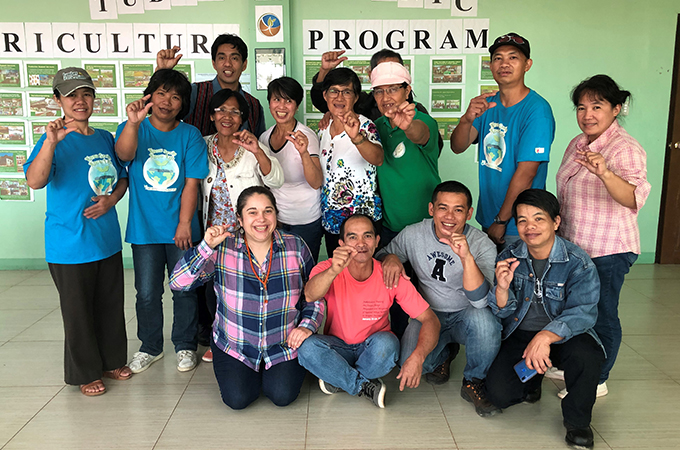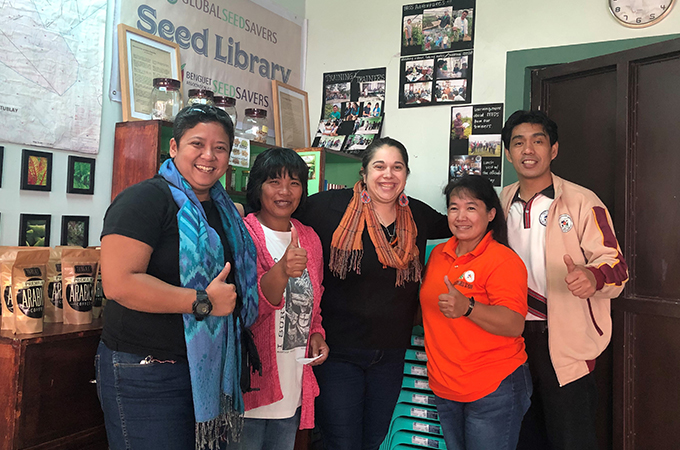A “seed library” is just exactly how it sounds. “It’s like a book library, but houses seeds,” says Sherry Manning ’05, U.S. executive director and founder of nonprofit Global Seed Savers based in the Philippines. “Farmers check out seeds, regrow them, and return seeds from plants they grew.”
Seed libraries are just one facet of the mission for Global Seed Savers, which was inspired by Manning’s time as a Peace Corps volunteer from 2006 to 2008: Living with her Filipino host family in the town of Tublay, Benguet Province in the Philippines, Manning immersed herself in the local farming culture and realized both the need and desire among farmers for organic seeds. She formally launched the organization in 2011.
Today, Global Seed Savers is funded by donors and grants and employs seven people. The program has educated more than 5,000 farmers in seed propagation; offers more than 120 different seed varieties; and co-manages three seed libraries within the Philippines. Global Seed Savers has also trained partners operating three additional libraries.
Bringing organic back to the farm
“Over the last 30 to 40 years, our agricultural system across the world has dramatically changed,” says Manning, who manages the organization full time in Denver, Colorado, and travels frequently to the Philippines. “Three major biochemical companies own the majority of the world’s food input, and it’s created a debilitating dependence for farmers, who must purchase seeds time and time again as opposed to being able to grow their own seeds as they used to.
“There is a massive shortage of organic seeds around the world.”
Living and working alongside Filipino farmers, Manning learned how important local seed production is in securing food sovereignty and biodiversity: “This ensures that communities are able to feed and support themselves,” she says. “Seed saving has been a tradition for time immemorial, and it’s really in the last 30 to 50 years that industrial agriculture has taken over. We are helping farmers return to the knowledge they remember and already built into their traditional systems.”
Global Seed Savers and farmers propagate market-driven crops, such as tomatoes, legumes and leafy greens. However, the growers wanted to also re-invigorate indigenous crops, and the libraries now offer traditional legume varieties, tubers, and native grains.
“Over years of colonization, a lot of food has been brought in and impacted local indigenous crops,” says Manning. “Seed libraries help restore the ancestral connection to their traditional food systems, which, frankly, are the crops that are more adaptive and can withstand the challenges the climate is bringing.”

U of R planted the seed for activism
“My entry point in all of this was my Peace Corps service and learning what it takes to be an organic farmer,” says Manning.
Manning’s immersion in U of R campus life while earning a bachelor’s in government in 2005 helped shape her decision to join the Peace Corps. Among many leadership positions during her undergraduate years, she served as president of Associated Students for two years. The opportunity to travel to Morocco during a May Term influenced her path forward.
“It was the first time I saw and understood some of the injustices and disparities that I had been reading about in courses,” she says. “That’s when I knew I really wanted to join the Peace Corps. I wanted to travel and get some experience but not as a tourist. I really wanted to know a place and contribute in some way.”
In September, the National Peace Corps Association recognized Manning with the 2021 Sargent Shriver Award for Distinguished Humanitarian Service, the organization’s highest honor, for her work with Global Seed Savers. The annual award is presented to returned Peace Corps volunteers “who continue to make a sustained and distinguished contribution to humanitarian causes at home or abroad.”
Manning shares credit for the prestigious Peace Corps award with her team: “Like any good small non-governmental organization, we have learned to pivot and adapt but stay true to our values and the work we do. The award is a testament to everyone in the organization.
“For me, the most rewarding thing is the personal relationships with our team, with our farmers, and with the community that I now call family.”
Nearly 300 Bulldogs have served in the Peace Corps, and the University of Redlands is among 11 institutions named a top producer of Peace Corps volunteers. Together, the University and the Peace Corps have launched Peace Corps Prep, an undergraduate certificate program combining targeted coursework with hands-on experience building the competencies needed for students to be Peace Corps volunteers or other intercultural fieldworkers.






